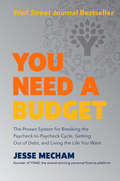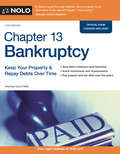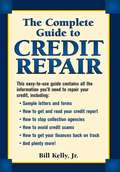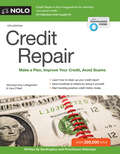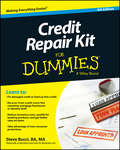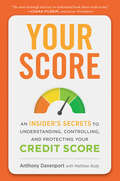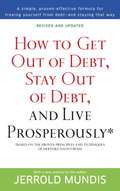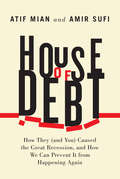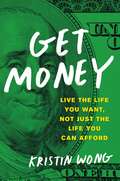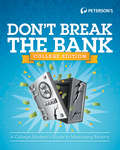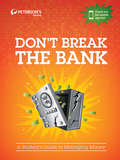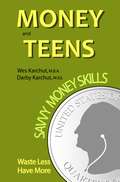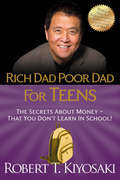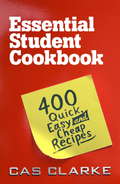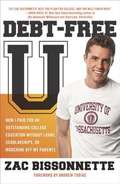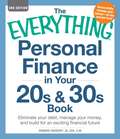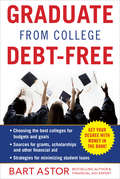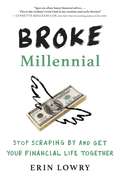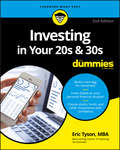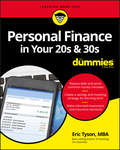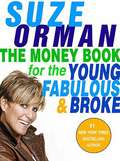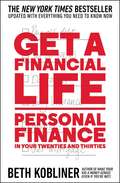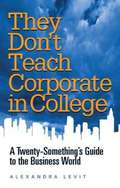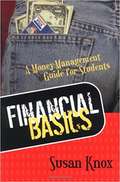Special Collections
Focus on Finance
- Table View
- List View
You Need a Budget
by Jesse MechamExperience a life free of financial stress and transform your relationship to money with this indispensable guide—the first book based on You Need A Budget’s proven method that has helped hundreds of thousands of people break the paycheck to paycheck cycle, get out of debt, and live the life they want to live.
No one should tell you what to do with your money—only you know what’s most important to you. Always guiding you back to your true priorities, Jesse Mecham will fundamentally change the way you think about your money and what it can do for you. His proven method—four, simple rules—will transform money management from a paralyzing burden to a powerful tool, putting you in total control of your life:
This tried-and-true system has changed the lives of hundreds of thousands of people by teaching them how to take charge, adjust money habits, eliminate stress, and build the life they want to live. Don’t waste another month counting down the minutes until payday...
Chapter 13 Bankruptcy
by Cara O'NeillAre you considering filing for Chapter 13 bankruptcy? Use this plain-English guide to decide if a Chapter 13 case is right for you. Chapter 13 Bankruptcy explains how the process works, which debts will get discharged at the end of your bankruptcy case, how much you'll pay through your plan, and what you'll have to do to keep your home and car.
Also, this book provides the knowledge you'll need to:
The newest edition contains legal updates, state-specific bankruptcy charts, examples using the newly revised official bankruptcy forms, and more.
The Complete Guide to Credit Repair
by Bill KellyWith more and more people declaring bankruptcy and total debt in this country rising, the time is perfect for a book like The Complete Guide to Credit Repair. Not only will this book show people how to repair bad credit to stay out of bankruptcy, it will show them how to avoid bad credit in the future and what they can do to strengthen their situation.
Credit bureau information and other vital resources have all changed within the last few years. The Complete Guide to Credit Repair - written in a simple, straightforward tone - is packed with up-to-date information on a topic that millions of people face everyday.
Credit Repair
by Robin Leonard and Amy LoftsgordonBad credit can prevent you from getting a mortgage, car loan, credit card, apartment, or even a job. It can also mean paying a bundle in rates and fees for any loans or credit you do get.
Use this comprehensive how-to manual to rebuild bad credit and protect improved credit. Learn how to:
Credit Repair Kit For Dummies
by Steve BucciCredit card debt is the third largest source of household indebtedness.
This new edition covers: major changes with the Consumer Financial Protection Bureau's (CFPB) inquiry into overdraft practices and their effect on consumers; dealing with the effect of tightened credit markets on those with good, marginal, or bad credit; best ways to recover from mortgage related score hits or minimize damage after walking away from a home; updated Vantage Score information; updated coverage on reporting programs like FICO Score watch, etc.; what makes a good FICO score today; a new section on significant others (boyfriend/girlfriend/spouse) and credit/debt sharing; Debt Relief Act in a mortgage meltdown situation; the latest tips and advice on dealing with identity theft and annoying collection calls; and more. Online you'll find sample credit reports, forms, templates, and other helpful tools to help whip your credit into shape.
If you have mediocre credit and want or need to better manage it in order to get a job, reduce insurance costs, qualify for banking products, and more,
Your Score
by Anthony DavenportAn insider’s look at what every consumer needs to know about their credit score—and most importantly, how to fix it.A healthy credit score is essential for a healthy financial life. But the precise mechanisms used to determine our credit scores are shrouded in mystery. Consumers aren’t usually told how their score is being used by all kinds of companies and banks to dictate financial terms that will strongly affect their daily lives. So when consumers interact with the world of credit, they do so from a position of weakness. With this revelatory guide, Anthony Davenport aims to change that. Finally, here is a consumer-friendly road map for understanding and navigating the secretive world of consumer credit. Davenport reveals where your credit score comes from, how to improve, maintain, or rescue it, and how to avoid hidden credit pitfalls. Your Score is an accessible manual designed to help you take control of your credit score and better navigate all the important financial decisions in your life.“Does a phenomenal job of pulling back the curtain and giving you a firsthand peek inside the hidden, often frustrating, world of credit scoring.”—Lynnette Khalfani-Cox, New York Times best-selling author of Zero Debt
How to Get Out of Debt, Stay Out of Debt, and Live Prosperously
by Jerrold MundisThe classic guide, revised with up-to-the-minute information!
Out of the Red:
Whether you are currently in debt or fear you're falling into debt, you are not alone. Sixty million Americans--from doctors to secretaries, from executives to the unemployed--face the same problem and live under the same daily stress. Based on the proven techniques of the national Debtors Anonymous program, here is the first complete, step-by-step guide to getting out of debt once and for all. You'll learn:
This book is neither sponsored nor endorsed by Debtors Anonymous. A recovered debtor, the author is intimately familiar with the success of the Debtors Anonymous program.
House of Debt
by Atif Mian and Amir SufiThe Great American Recession resulted in the loss of eight million jobs between 2007 and 2009. More than four million homes were lost to foreclosures. Is it a coincidence that the United States witnessed a dramatic rise in household debt in the years before the recession―that the total amount of debt for American households doubled between 2000 and 2007 to $14 trillion? Definitely not. Armed with clear and powerful evidence, Atif Mian and Amir Sufi reveal in House of Debt how the Great Recession and Great Depression, as well as the current economic malaise in Europe, were caused by a large run-up in household debt followed by a significantly large drop in household spending.
Though the banking crisis captured the public’s attention, Mian and Sufi argue strongly with actual data that current policy is too heavily biased toward protecting banks and creditors. Increasing the flow of credit, they show, is disastrously counterproductive when the fundamental problem is too much debt. As their research shows, excessive household debt leads to foreclosures, causing individuals to spend less and save more. Less spending means less demand for goods, followed by declines in production and huge job losses. How do we end such a cycle? With a direct attack on debt, say Mian and Sufi. More aggressive debt forgiveness after the crash helps, but as they illustrate, we can be rid of painful bubble-and-bust episodes only if the financial system moves away from its reliance on inflexible debt contracts. As an example, they propose new mortgage contracts that are built on the principle of risk-sharing, a concept that would have prevented the housing bubble from emerging in the first place.
Thoroughly grounded in compelling economic evidence, House of Debt offers convincing answers to some of the most important questions facing the modern economy today: Why do severe recessions happen? Could we have prevented the Great Recession and its consequences? And what actions are needed to prevent such crises going forward?
Get Money
by Kristin WongLearn how to live the life you want, not just the life you can afford in this highly engaging, step-by-step guide to winning at personal finance!
Managing your money is like going to the dentist or standing in line at the DMV. Nobody wants to do it, but at some point, it's inevitable: you need to clean your teeth, renew your license, and manage your personal finances like a grown-up. Whether you're struggling to pay off student loan debt, ready to stop living paycheck to paycheck, or have finally accepted that your Beanie Baby collection will never pay off, tackling your finances may seem immensely intimidating. But it doesn't have to be. In fact, by approaching it as a game--or something that requires you to set clear goals, as well as face challenges you must "beat"--personal finance can not only be easy to understand, but it can also be fun!
In Get Money, personal finance expert Kristin Wong shows you the exact steps to getting more money in your pocket without letting it rule your life. Through a series of challenges designed to boost your personal finance I.Q., interviews with other leading financial experts, and exercises tailored to help you achieve even your biggest goals, you'll learn valuable skills such as:
Simply put, with this gamified guide to personal finance, you'll no longer stress about understanding how your finances work--you'll finally "get" money.
Don't Break the Bank
by Peterson'SPeterson's Don't Break the Bank: College Edition is the must-have guide for college students who want--or need--to learn how to manage their money. Inside you'll find real-life advice from students as well as expert money-saving tips from financial experts. This guide will help you become financially savvy by explaining important aspects related to earning money, tips for stretching it and sticking to a budget, the pros and cons of credit, advice for saving for your future, and much more. Fun graphics along with the informative, easy-to-read chapters make this the perfect guide for the teen on the go who wants to gain some financial dollars and sense!
Don't Break the Bank
by Peterson'SMiddle school and high school students spend more money than ever these days, but most have very little (if any) knowledge when it comes to personal finances. The truth is that most schools don't have time to teach a Personal Finances 101 course. So what are today's students (and their parents) to do? Peterson's Don't Break the Bank comes to the rescue! It's a brand new, easy-to-comprehend guide to help students become financially savvy.
Readers will find such financially relevant chapters as All About Money, Part-Time Jobs and Ways to Make Money; Analyzing Your Paycheck; Making Sense Out of Banking; Online Banking and Bill Paying; Saving for a Rainy Day; Understanding Debt and Credit; Charge It! (Paying with Plastic); Don't Spend It All in One Place: Creating-and Sticking to-a Budget; Money U: Managing Your Finances While in College; Investing; and How to Make Your Money Grow! Inside you'll find:
Money and Teens
by Wesley Karchut and Darby KarchutDon't take on the world without this book. Learn the essential money skills before you: hand over your credit card, take out a student loan, sign up for a car loan, start a new job, buy one more thing online. Practical, no-nonsense guide to managing your money so that you waste less and have more.
This book offers real-life skills you can use right away, not fake promises to make you rich or to find "easy money. " "I learned more about managing my money than I learned in school or from my parents. " Learn how to avoid the money minefields awaiting you at every turn. Don't waste another dime on fees, sneaky retailer pricing games, and online come-ons. Master the essential money skills - not theory - and apply them right away.
Endorsed by the Jumpstart Coalition for Personal Financial Literacy, a non-profit coalition of public and private sponsors committed to furthering financial literacy for K-12 with chapters in 49 states.
Rich Dad Poor Dad for Teens
by Robert T. KiyosakiYou’re never too young to learn the language of money… and the lessons that rich dad taught Robert. Like it or not, money is a part of our everyday lives and the more we understand it, the better the chance that we can learn to have our money work hard for us—instead of working hard for money all our lives. That starts with learning the language of money.
This book, created from the international bestseller Rich Dad Poor Dad, shares Robert’s inspiring person story but teaches how to make smart choices. Packed with straight talk, sidebars, and quizzes, this book will jumpstart a child’s personal and financial success by teaching: How to speak the language of money, ways to make money work for you, tips for success (including: “Work to learn, not to earn.”), and why games can help you understand money, investing, and ways to choose your best path to financial freedom.
Essential Student Cookbook
by Cas ClarkeCas Clarke originally combined her two most successful books to create THE ESSENTIAL STUDENT COOKBOOK. This fully updated version of the bestselling compendium puts everything into one modern and redesigned volume for the aspiring student cook. Based on Cas's own experience, it gives basic guidance on essential equipment, what to take for the store cupboard and how to cope with the vagaries of cooking in hall. The recipes are completely straightforward and assume no prior knowledge. They take into account the student's limited means and time but also cater for the odd occasion when they might want to splash out or entertain friends.
Debt-Free U
by Andrew Tobias and Zac BissonnetteThese days, most people assume you need to pay a boatload of money for a quality college education. As a result, students and their parents are willing to go into years of debt and potentially sabotage their entire financial futures just to get a fancy name on their diploma.
But Zac Bissonnette is walking proof that this assumption is not only false, but dangerous-a class con game designed to rip you off and doom your student to a post-graduation life of near poverty . From his unique double perspective-he's a personal finance expert (at Daily Finance) AND a current senior at the University of Massachusetts-Zac figured out how to get an outstanding education at a public college, without bankrupting his parents or taking on massive loans.
Armed with his personal knowledge, the latest data, and smart analysis, Zac takes on the sacred cows of the higher education establishment. He reveals why a lot of the conventional wisdom about choosing and financing college is not only wrong but hazardous to you and your child's financial future. You'll discover, for instance, that:
Zac can prove every one of those bold assertions - and more. No matter what your current financial situation, he has a simple message for parents: "RELAX! Your kid will be able to get a champagne education on a beer budget!"
The Everything Personal Finance in Your 20s & 30s Book
by Howard DavidoffDo you feel like you'll never pay off your student loans? Worried about your mounting credit card debt? Wondering when you'll ever make enough money to stop living paycheck to paycheck? You're not alone - millions of young Americans are finding it hard to save for the future and still pay today's bills on time.
But with The Everything Personal Finance in Your 20s and 30s Book, 3rd Edition, you'll learn how to be financially independent by:
You'll also learn how the Consumer Financial Protection Bureau can help you navigate the often-confusing world of financial service products. With this easy-to-use guide, you'll learn how to manage, save, and invest wisely - starting today!
Graduate from College Debt-Free
by Bart AstorWith college graduates earning over a million dollars more than high school grads will earn during the course of their lifetime, getting a college degree is incredibly important. However, the cost of college keeps rising and navigating the maze of financial aid options grows more challenging every year. This book is a comprehensive guide to saving for college, scholarships, financial assistance and more.
YOU WILL DISCOVER:
Broke Millennial
by Erin LowryStop Living Paycheck to Paycheck and Get Your Financial Life Together (#GYFLT)!
If you’re a cash-strapped 20- or 30-something, it’s easy to get freaked out by finances. But you’re not doomed to spend your life drowning in debt or mystified by money. It’s time to stop scraping by and take control of your money and your life with this savvy and smart guide.
Broke Millennial shows step-by-step how to go from flat-broke to financial badass. Unlike most personal finance books out there, it doesn’t just cover boring stuff like credit card debt, investing, and dealing with the dreaded “B” word (budgeting). Financial expert Erin Lowry goes beyond the basics to tackle tricky money matters and situations most of us face #IRL, including:
Packed with refreshingly simple advice and hilarious true stories, Broke Millennial is the essential roadmap every financially clueless millennial needs to become a money master. So what are you waiting for? Let’s #GYFLT!
Investing in Your 20s and 30s For Dummies
by Eric TysonIn order to build a retirement portfolio that is capable of covering expenses in your golden years, it's necessary to start saving while you're young. Many individuals realize the importance of investing early in life, but simply don't know where to begin.
Investing in Your 20s & 30s For Dummies provides emerging professionals, like yourself, with the targeted investment advice that you need to establish your own unique investment style. Covering everything from the latest tax laws to new and improved investing funds, this latest edition helps you evaluate assets and manage risk to invest money wisely, and monitor your progress.
There's no time like the present to start investing. So, get started today!
Personal Finance in Your 20s and 30s For Dummies
by Eric TysonMillennials often confront greater difficulties—including economic uncertainty and student debt—than those who came before them. This new financial responsibility can be intimidating, and many people are unsure where to begin. Personal Finance in Your 20s & 30s For Dummies will help Millennials to be confident about managing their finances and get on a clear path toward financial security.
Inside, trusted financial advisor Eric Tyson shows students and recent grads how to make smart financial decisions in order to pay off student loans, avoid any additional debt, and create a solid plan to ensure their financial success. From avoiding common money mistakes to making informed investment choices, Personal Finance in Your 20s & 30s For Dummies covers it all!
Get ready to forge your own path to financial security!
The Money Book for the Young, Fabulous & Broke
by Suze OrmanThe New York Times bestselling financial guide aimed squarely at "Generation Debt"—and their parents—from the country's most trusted and dynamic source on money matters.
The Money Book for the Young, Fabulous & Broke is financial expert Suze Orman's answer to a generation's cry for help. They're called "Generation Debt" and "Generation Broke" by the media — people in their twenties and thirties who graduate college with a mountain of student loan debt and are stuck with one of the weakest job markets in recent history. The goals of their parents' generation — buy a house, support a family, send kids to college, retire in style — seem absurdly, depressingly out of reach. They live off their credit cards, may or may not have health insurance, and come up so far short at the end of the month that the idea of saving money is a joke. This generation has it tough, without a doubt, but they're also painfully aware of the urgent need to take matters into their own hands.
The Money Book was written to address the specific financial reality that faces young people today and offers a set of real, not impossible solutions to the problems at hand and the problems ahead. Concisely, pragmatically, and without a whiff of condescension, Suze Orman tells her young, fabulous & broke readers precisely what actions to take and why. Throughout these pages, there are icons that direct readers to a special YF&B domain on Suze's website that offers more specialized information, forms, and interactive tools that further customize the information in the book. Her advice at times bucks conventional wisdom (did she just say use your credit card?) and may even seem counter-intuitive (pay into a retirement fund even though your credit card debt is killing you?), but it's her honesty, understanding, and uncanny ability to anticipate the needs of her readers that has made her the most trusted financial expert of her day.
Over the course of ten chapters that can be consulted methodically, step-by-step or on a strictly need-to-know basis, Suze takes the reader past broke to a secure place where they'll never have to worry about revisiting broke again. And she begins the journey with a bit of overwhelmingly good news (yes, there really is good news): Young people have the greatest asset of all on their side — time.
Get a Financial Life
by Beth KoblinerA completely revised and updated fourth edition of the New York Times bestseller, designed to guide younger adults through the world of personal finance.More than ever before, people in their twenties and thirties need help getting their financial lives in order. And who could blame them? These so-called millennials have come of age in the wake of the worst economic crisis in memory, and are now trying to get by in its aftermath. They owe record levels of student loan debt, face sky-high rents, and struggle to live on a budget in an uncertain economy. It&’s time for them to get a financial life. For two decades, Beth Kobliner&’s bestseller has been the financial bible for people in their twenties and thirties. With her down-to-earth style, she has taught them how to get out of debt, learn to save, and invest for their futures. In this completely revised and updated edition, Kobliner shares brand-new insights and concrete, actionable advice geared to help a new generation of readers form healthy financial habits that will last a lifetime. With fresh material that reflects the changing digital world, Get a Financial Life remains an essential tool for young people learning how to manage their money. From tackling taxes to boosting credit scores, Get a Financial Life can show those just starting out how to decrease their debt, avoid common money mistakes, and navigate the world of personal finance in today&’s ever-changing landscape.
They Don't Teach Corporate in College
by Alexandra LevitWhen straight A student Alexandra Levit graduated from college, she was hell-bent on skipping up New York City's corporate ladder. But after six months on the job, Levit was so stressed out that she was ready to ditch the corporate world completely and head to graduate or law school. Eventually, by sticking around and paying attention to the few people around her who weren't dropping from stress-induced coronaries, Levit developed many of the skills that are crucial to staying sane and building a career. By her mid-twenties, she had been promoted four times.
Highlights include: Unorthodox but proven job-hunting techniques. Making a memorable first impression. Navigating a company's social scene. Practicing cringe-free networking. Mastering goal-setting and self-promotion. Combating negativity. Coping with difficult personalities. Finding a new position, and gracefully exiting from the old.
At 28 years old, Alexandra Levit has spent all of her post-college career in Corporate America. She most recently worked in marketing communications for Computer Associates, the fourth largest software company in the world. Levit was previously an account manager at Edelman Public Relations Worldwide, where she developed award-winning PR campaigns for Fortune 500 clients, including Microsoft, Pfizer, Philip Morris, Procter & Gamble, and Unilever.
Financial Basics
by Susan KnoxJason is typical of today's college students, who are assuming unprecedented debt burdens because of relaxed limits on student loans and easily obtained credit cards. Many on college campuses are calling it a fiscal crisis.
Financial Basics tackles the gaps in the personal financial knowledge of college students. Beginning with debit-credit card issues, student loan decisions, and the challenge of managing and reducing debt, Knox walks readers through money management. She skillfully addresses the how-to's of checking accounts, spending plans, emergency funds, and credit histories. She discusses financial personalities and the emotions of money, as well as practical record-keeping and simple filing techniques.
In Financial Basics, Knox blends her extensive money-management experience with her desire to inform and help students master their finances: she shares experiences about money lessons learned in college, and offers sound solutions and advice for students and their families. Since everyone does not handle money in the same way, Knox gives money-management options for readers to find their best way. The book includes helpful worksheets and is written in an easy-to-read style, using testimonials and examples that will ring true to students.
The Starving Student's Cookbook
by Dede HallEven you -- yes, you -- can learn to cook simple, filling, nutritious, and delicious meals. Inexpensive, too! Here's the cookbook that shows you how! Whether you have five minutes to make a dynamite party punch or the whole afternoon to simmer a pot of homemade beef stew, this easy-to-read guide will take you through it, step by step.
You'll find classics like English Muffin Pizzas and Meatloaf Everyone Loves, as well as vegetarian entrees and microwave meals that are not only quick and cheap, but also good! Plus, updated nutrition information and health tips are provided. Each recipe includes the time required for preparation, illustrations of the implements used, and easy-to-follow instructions that will leave you full and satisfied instead of hungry and frustrated. So if cooking your dinner isn't exactly the way you want to spend your whole weekend, make The Starving Students' Cookbook required reading this and every semester.
